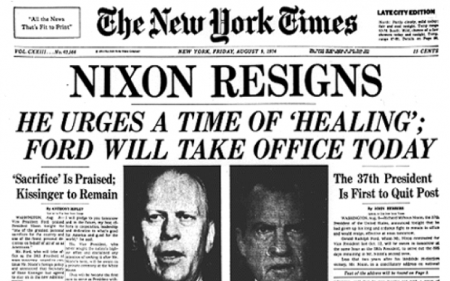How Does A Scandal Become A ‘Gate’?!
 ’Plebgate’ has dominated the news of late, and has also been coined ’Plodgate’, and even ’Gategate’, so what’s with all these gates?
’Plebgate’ has dominated the news of late, and has also been coined ’Plodgate’, and even ’Gategate’, so what’s with all these gates?
The ‘Plebgate’ scandal in question is all about an incident where Conservative MP Andrew Mitchell, the former Government Chief Whip, allegedly called police officers "plebs" while they were on duty at Downing Street and wouldn’t open a gate for him to leave on his bicycle in September last year.
Following subsequent media attention, Mitchell resigned, but CCTV footage and other evidence has recently led to questions about the police officers’ account of the incident, and an investigation has been launched.
But this is really a small, run of the mill, garden gate compared to some of the more serious events that have actually rocked a nation. Um, let’s see, we have the original ‘Watergate’ – which led to the demise of U.S. President Richard Nixon, and was the origin of the suffix ‘-gate’.
The term ‘Watergate’ came about in 1972 when President Nixon was implicated in a cover-up following the arrest of five burglars after a break-in at the Democrat National Committee HQ in the Watergate complex, Washington DC.
Since then, the suffix ‘-gate’ has been used with nouns and names to imply a scandal, cover-up, or unethical behaviour particularly within politics, but it’s widely used in the world of entertainment, royalty, sports, and news in general, both here and abroad.
 Recently we’ve had David Cameron involved in ‘Pizzagate’, Gordon Brown starred in ‘Biscuitgate’ and ‘Bigotgate’, and of course, President Bill Clinton was embroiled in ‘Monicagate’.
Recently we’ve had David Cameron involved in ‘Pizzagate’, Gordon Brown starred in ‘Biscuitgate’ and ‘Bigotgate’, and of course, President Bill Clinton was embroiled in ‘Monicagate’.
The royal family are not immune either – there was ‘Squidgygate’, a reference to a pet name for Princess Diana by her alleged lover, which was quickly followed by ‘Camillagate’.
‘Sachsgate’ was coined following public outrage over voice messages left by Russell Brand and Jonathan Ross on actor Andrew Sachs’ answering machine, Rio Ferdinand's drugs ban was branded ‘Riogate’, and the drama continues with ‘Hackgate’, the phone hacking controversy that involved the now defunct News Of The World tabloid.
France has endured ‘Winegate’, a sacre bleu situation involving chemicals being used to turn vinegar wine into table wine, and Australia had ‘Utegate’ which saw politicians accused of acting improperly on behalf of a car dealer seeking financial assistance from a government agency.
These are just a few ‘-gates’ that have made the headlines, and they definitely won’t be the last, after all, as English historian Thomas Fuller once said: “A lie has no leg, but a scandal has wings.” What are some ‘-gates’ you can come up with?


